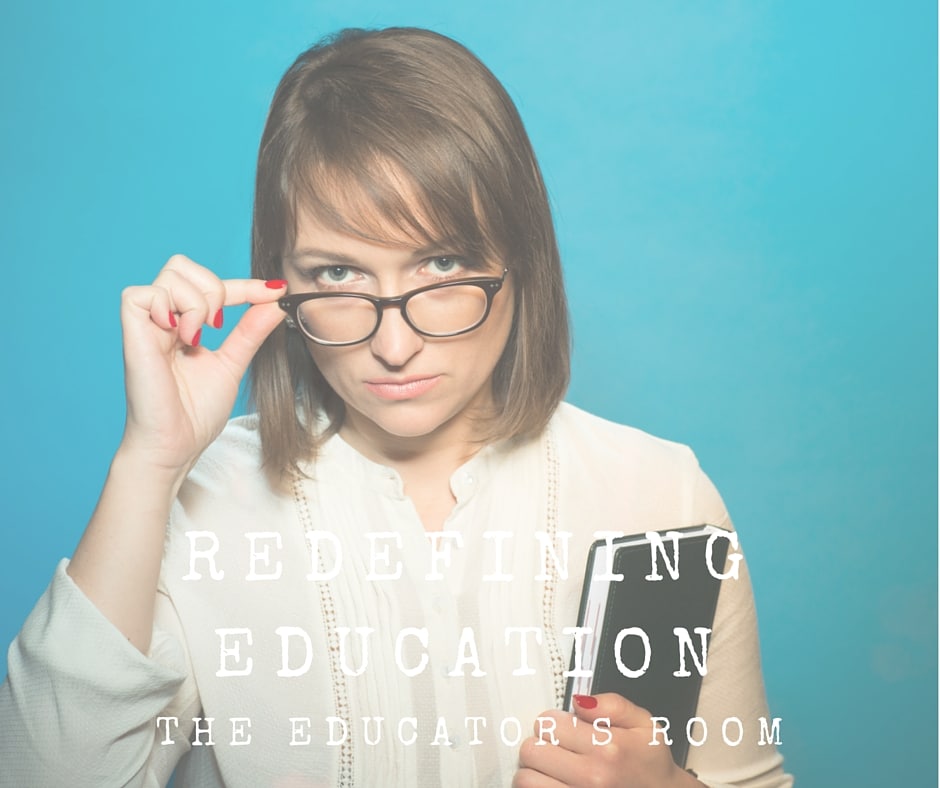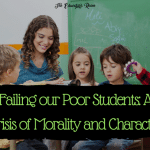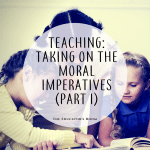I’m a big picture sort of person. I like to think about the larger scope of things and how the here and now feeds into the larger scheme of things. Sometimes this is a huge curse, seeing as how I live somewhat in a fairytale-type of mentality most of the time.
Yet I have been doing some deep soul-searching, not only in my personal life, but in my career as well. I’ve been teaching in a classroom for 20 years. Twenty years, folks. I still have difficulty wrapping my head around that amount of time, in a world where most individuals will go through at least three Career Fields in all of their professional working years. I’ve been one that has remained in the same profession and in the same place within my profession for the entirety of my life so far. All that has been by choice. And I am comfortable there. A little too comfortable for, well, my own comfort.
I’ve seen major trends in education come and go. Trends which ebb and flow over the course of two decades, with attention being taken off of how much of a privilege it is to have an education in the United States, to the school setting filling in for the decline of the nuclear family, to our children being reduced to the equivalent of lab rats being literally tested with every “new and improved” technique, tool and training imaginable, and for those techniques, tools and trainings that do not produce the desired effect, we have generations of test subjects that are wandering around with untapped potential that might possibly have been tapped had the proper techniques, tools and trainings ‘worked’, whatever that means.
And it’s not a big deal, because there are plenty of test subjects available.
We have defined the undefineable, reducing little humans to numbers, herds and test scores. Whatever happened to helping build productive citizens? Nurturing kind people?
When I first started teaching I remember my goal being to teach children from a young age to enjoy reading, remain inquisitive and to be compassionate and unselfish individuals. I’ve been thinking in depth about the state of education as it pertains to families today and trying to inventory what the most important skills are that children need to learn over the course of the many years they spend in elementary and secondary education and what the overall goal is for all of these years. We are confusing the idea of ‘learning’ and ‘educating’, without giving much thought to the differences –and power- these two words hold.
How is it that when I heard a friend of mine comment that her son, a high school junior, was thinking of becoming a teacher, I shook my head and automatically said, “NO! Encourage anything except teaching!” without so much as a second thought? Have I too fallen down the rabbit hole of discouraging others of becoming what was once held in high esteem?
Day in and day out I have seen entitled children who come from entitled parents walking through school doors, heads down in digital devices, not seeing the importance of bettering oneself, just ‘doing time’ in the classrooms that were long ago designed to shape the minds of budding engineers, artists, scientists and even teachers, but have since been reduced to incarceration of underage individuals for seven or so hours a day.
So I have allowed myself to revisit the aforementioned question: What are the most important skills that our students need to learn in order to become productive citizens?
Since I am an early childhood teacher, I’ll pose it this way: If I were to be able to time travel ahead into the next two decades and visit my students, what would I hope to see in them?
None of it focuses on academics.
NONE. OF. IT.
Don’t confuse that for me saying that academics aren’t important. That’s definitely not my point. But I do know for a fact that academics are developed over time as children are ready. Reading cannot be forced. Number skills cannot be forced. Believe it or not, children were wired to ask questions and learn; they can do this on their own. Big surprise? Well since child development has been taken out of the equation of educating children, it actually might be for some newer teachers.
What I see now compared to even six years ago, are children that need the basics in life. They need to be taught compassion. They need to be taught respect. They need to be taught how to communicate. They need to be taught how to be responsible. They need to be taught that their opinions and ideas and dreams and voices are important.
They need to be taught, wait for it: Basic Manners.
Even more importantly all of the above need to be modeled for the kids. Imagine that, adults modeling acceptable behavior for children. Just think about what we see in the cars and busses waiting in the pick up line at the end of the day. That should solidify how important it is that these children see appropriate behavior modeled for them at least during the time that we have them in our care.
So as you ponder the last couple of months of school, as stressful as we all know they are, be sure to remember that these are little people who are looking to you to be teach them what they need to become big people.
Where will your focus lie?






